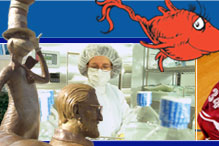| |
 |
|
 |
 |
Molecular PathologyOFFICE: 1012 Basic Science Building, The Graduate ProgramThe goal of the molecular pathology Ph.D. program is to provide research training in the molecular mechanisms of human disease for students pursuing biomedical careers in academia or the biotechnology industry. The program is interdepartmental in nature. It is centered in the Department of Pathology, but faculty members are also drawn from other departments and institutions. The program provides a comprehensive knowledge of normal and abnormal biological processes, with particular emphasis on the molecular mechanisms of human diseases. Course WorkThe goal of the Molecular Pathology Program is to produce outstanding researchers focused on the molecular basis of disease who also understand disease at levels of histology, pathology, and treatment. The basic science curriculum includes classes in Molecular Biology of the Cell, Methods in Cellular and Molecular Pathology, the Molecular Pathology of Cancer, and Neurologic and Muscle Disease. Electives are offered in Microbial Pathogenesis and Mouse Models for Human Disease. Learning is focused on reading and evaluating current scientific literature, with special attention to identifying the major open questions within a field and determining the correct experimental plan to answer these questions. Two electives are required, and may also be selected from graduate level courses offered by other medical school programs or undergraduate departments (biology, chemistry and biochemistry, bioengineering). This option allows students the opportunity to acquire advanced training in areas they have selected for graduate research. popular classes are graduate level immunology, genetics, neurobiology, molecular modeling, microbial pathogenesis, and mouse models of human disease. An education in histology and pathology is acquired by taking the School of Medicine course in histology and an overview course in human pathology developed by Department of Pathology faculty for molecular pathology and pharmacy students. All students must take five of seven core courses offered by faculty members from the Department of Pathology. Students may elect to take in-depth pathology training in their particular disease(s) of interest by attending a set of comprehensive lectures (eight to twelve) taught as part of the comprehensive medical school pathology curriculum. Concurrent with their thesis research, third-year students can acquire a practical consideration of the clinical treatment of disease by attending pathology conferences, including Breast Pathology Conference, Tumor Board, Pediatric Autopsy, and Neuropathology “Brian-cutting” conference. In such conferences, students learn how disease presents and progresses, how physicians currently treat disease, what the practical obstacles are in disease treatment, and where the opportunities are for development of molecular therapeutics. ExaminationsFirst Qualifying Examination (Minor Proposition) The purpose of this examination is to test the student’s ability to choose a research problem in molecular pathology and to propose an experimental approach to its solution. The problem should be unrelated to the student’s thesis project. The student is expected to demonstrate knowledge in molecular biology and basic pathology. The first qualifying examination will be taken by the end of the fall quarter of the second year. Second Qualifying Examination (Major Proposition) The second qualifying examination, a university requirement, consists of an oral report by the student about research accomplished and the goals to be achieved for completion of the thesis. Upon successful completion of the examination, the student will advance to candidacy. The second qualifying examination should be completed by the end of the third year, and must be completed by the end of the fourth year. Departmental Ph.D. Time Limit PoliciesStudents must be advanced to candidacy by the end of four years. Total university support cannot exceed six years. Total registered time at UCSD cannot exceed seven years. |